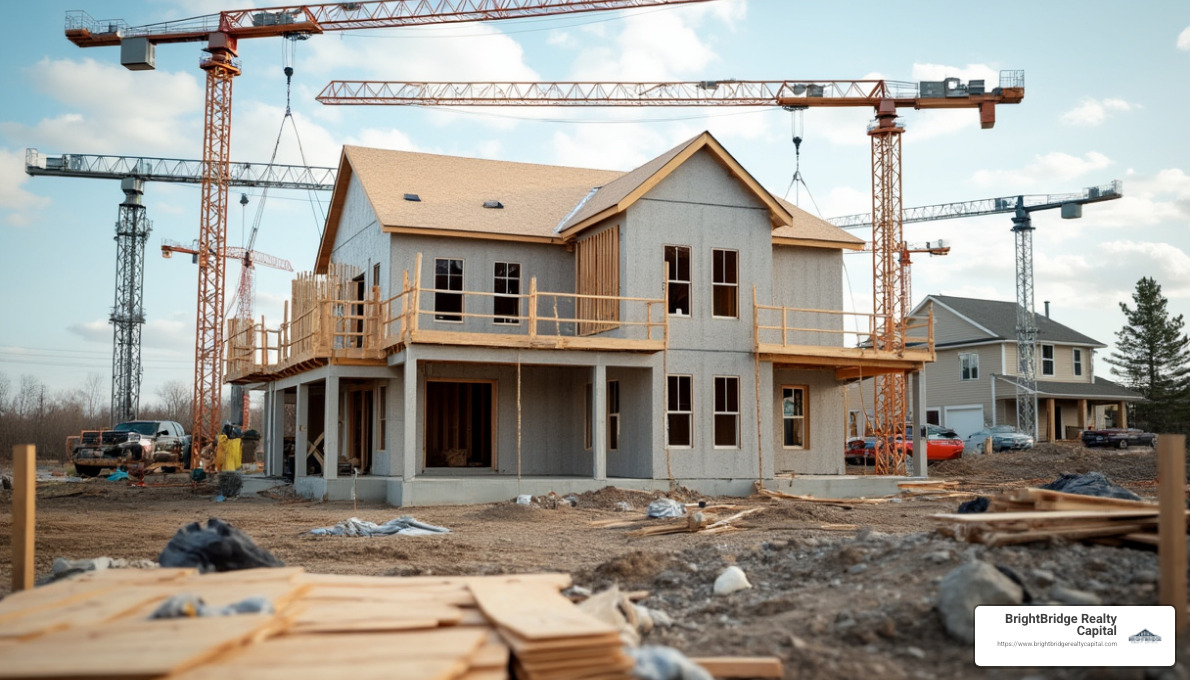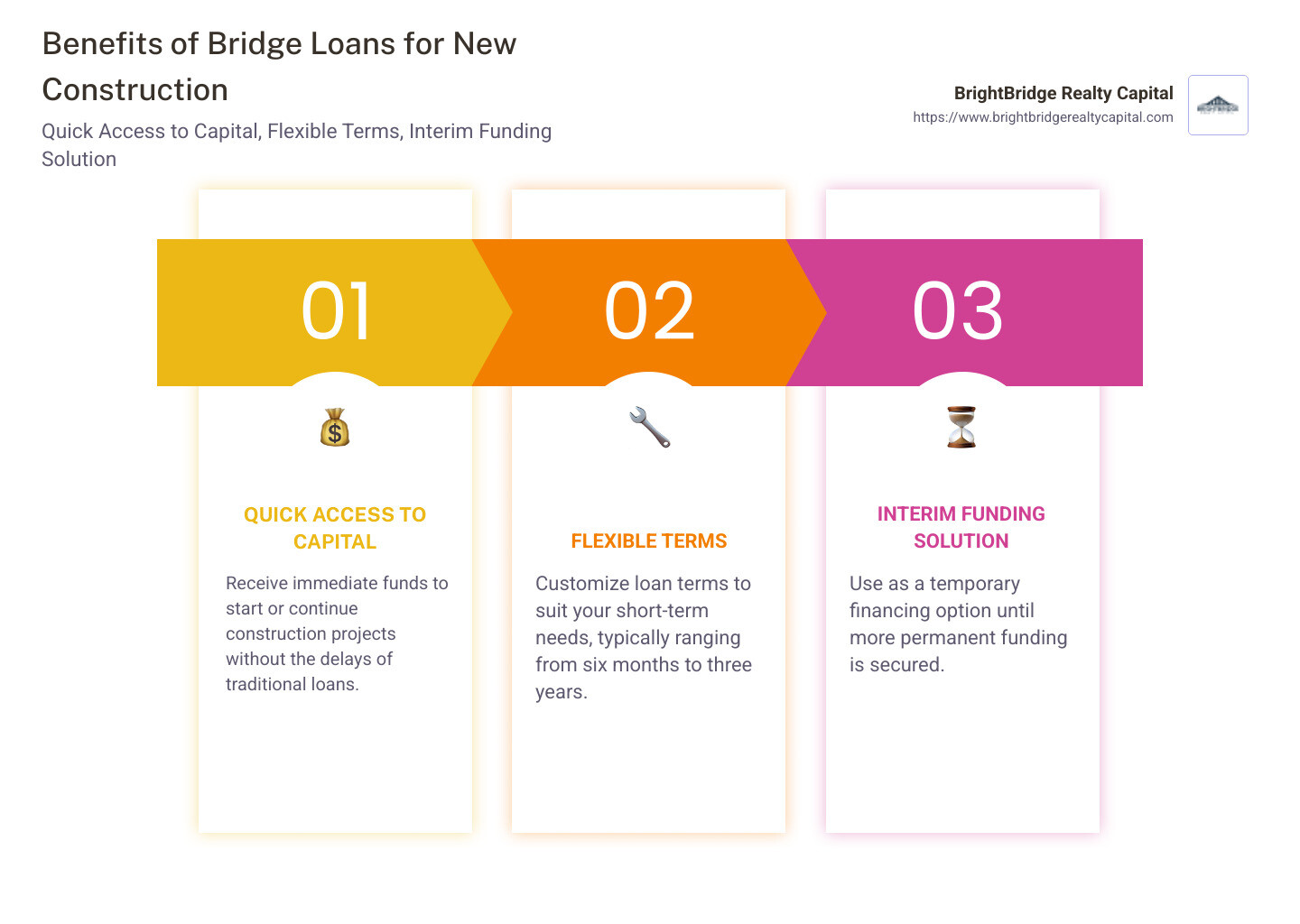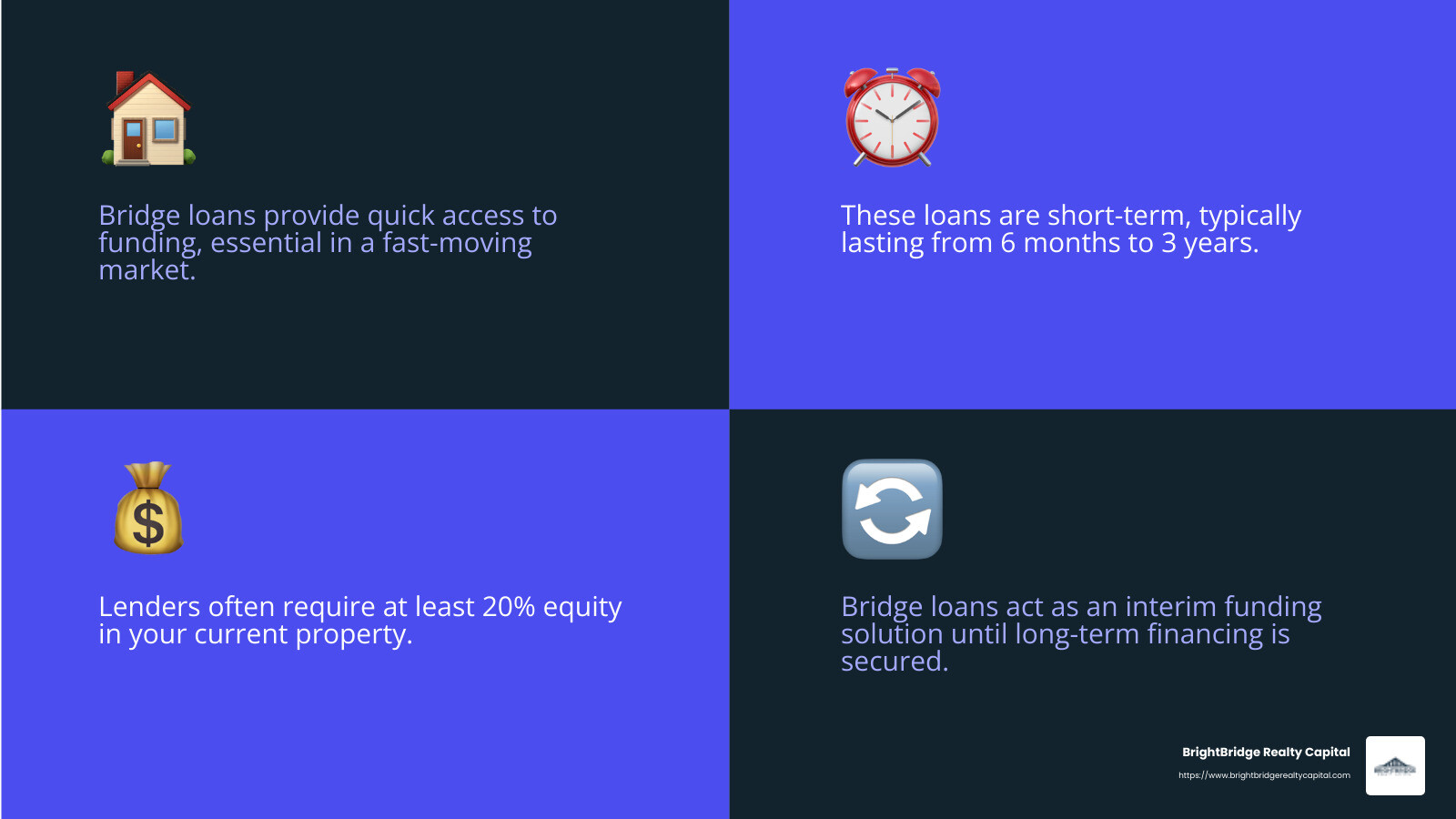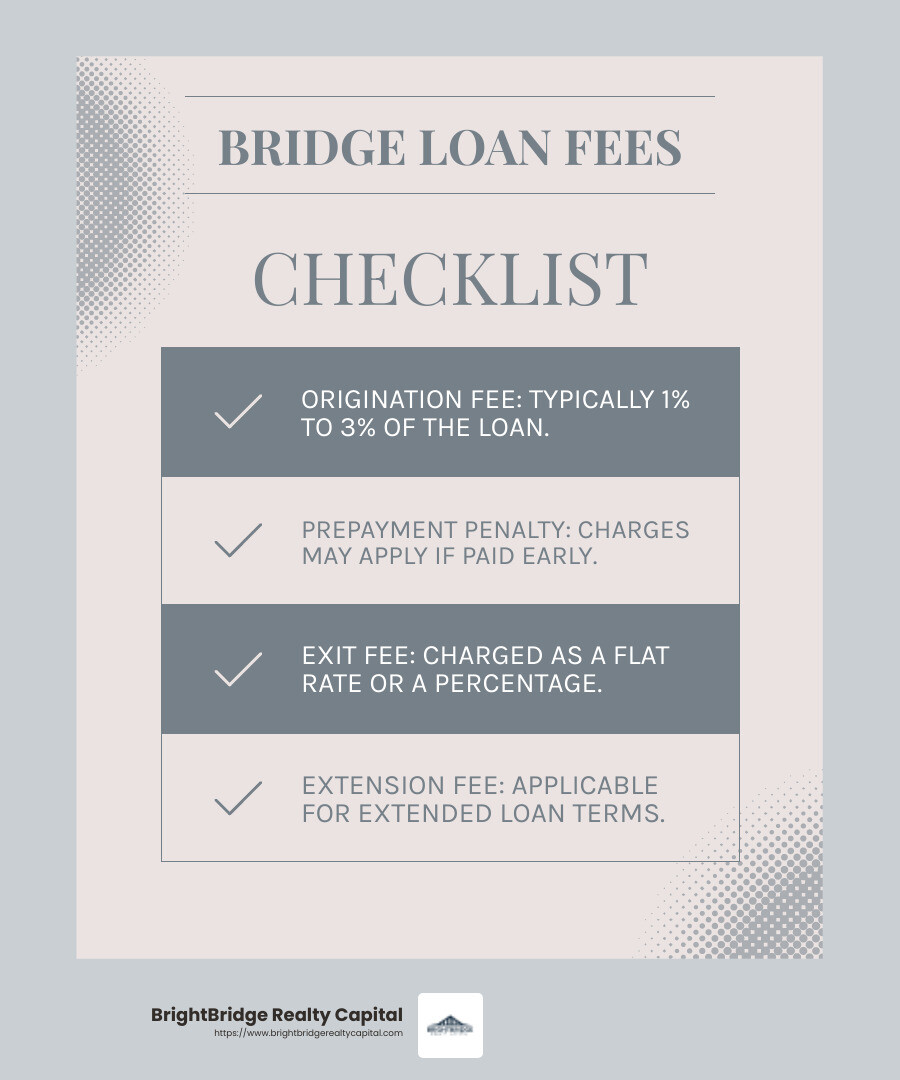From Ground Up: Financing New Builds with Bridge Loans

Bridge loan for building a house is a pivotal financing tool that helps property developers and investors bridge the gap between starting a new project and securing long-term financing. In the world of real estate, developers need quick and reliable funding solutions to seize opportunities. Bridge loans provide short-term, flexible financing options specifically custom for new construction, allowing builders to break ground and keep projects on track.
Here's what you can expect from a bridge loan for building a house:
- Quick Access to Capital: Provides immediate funds to start or continue construction without waiting for a traditional loan.
- Flexible Terms: Can be customized to meet short-term needs, typically ranging from six months to three years.
- Interim Funding Solution: Acts as a temporary solution until more permanent financing is secured.
These loans are essential in today's competitive market where timing is crucial. Lenders at BrightBridge Realty Capital offer such loans aimed at empowering investors and developers to move forward swiftly with projects.

Relevant articles related to bridge loan for building a house:
Understanding Bridge Loans for Building a House
When you're building a house, timing and funding are everything. A bridge loan for building a house is a short-term financing option that provides the necessary cash flow to get your project off the ground. Think of it as a financial bridge that helps you cross from the start of construction to the point where you secure long-term financing.
Short-Term Financing
Bridge loans are designed to fill the gap between immediate needs and future funding. They typically last from six months to three years, offering a quick financial boost when you need it most. This short-term nature means you can access funds rapidly, which is vital in a fast-moving real estate market.
Equity Utilization
One of the key aspects of a bridge loan is its reliance on equity. Lenders often require you to have at least 20% equity in your current property. This equity acts as collateral, securing the loan and giving lenders confidence in your ability to repay. By leveraging your existing equity, you can open up the funds needed to start building your dream home.
Interim Funding Solution
Bridge loans serve as an interim funding solution. They provide the necessary capital to kickstart construction while you work on securing more permanent financing, like a mortgage or a construction-to-permanent loan. This flexibility allows builders and developers to keep projects moving without delay.

In summary, a bridge loan for building a house offers a lifeline for those looking to begin construction quickly. It leverages your existing equity, provides short-term financial support, and acts as a bridge to long-term funding solutions. With BrightBridge Realty Capital, you can steer the complexities of real estate financing with ease, ensuring your project stays on track and on time.
How Bridge Loans Work
When it comes to bridge loans for building a house, understanding the nitty-gritty of loan terms, interest rates, and fees is crucial. These loans are not your typical long-term mortgages. Instead, they are short-term solutions designed to help you move swiftly in the real estate market.
Loan Terms
Bridge loans usually span from six months to a year, though they can sometimes extend up to three years. The short duration is intentional, providing just enough time to transition from one property to another. This makes them ideal for those who need to act fast, whether you're buying land or starting construction. With BrightBridge Realty Capital, you can expect flexible terms custom to your specific needs.
Interest Rates
Because bridge loans are short-term, they come with higher interest rates compared to traditional loans. This is something to keep in mind as it affects the overall cost of borrowing. However, the benefit is that you get access to funds quickly, which can be a game-changer in competitive real estate markets.
Fees
Bridge loans come with their own set of fees. Here’s a quick rundown:
- Origination Fee: Typically 1% to 3% of the total loan amount.
- Prepayment Penalty: Some lenders may charge this if you pay off the loan early.
- Exit Fee: Charged when the loan is repaid, either as a flat rate or a percentage of the loan amount.
- Extension Fee: Applicable if you need to extend the loan term.

Navigating these components can feel overwhelming, but with the right lender, like BrightBridge Realty Capital, you’ll have the guidance you need. They ensure you understand each aspect, so there are no surprises down the road.
A bridge loan for building a house is a powerful tool when used wisely. It provides the financial agility needed to seize opportunities, even if it comes at a higher cost. Knowing the terms, rates, and fees will prepare you to make informed decisions and keep your construction project on track.
Benefits of Using a Bridge Loan for New Builds
When it comes to financing new construction, a bridge loan for building a house offers several compelling benefits that can make your project smoother and more efficient.
Quick Funding
One of the standout advantages of bridge loans is their ability to provide quick funding. Unlike traditional loans that may take months to process, bridge loans can often be approved in a matter of days or weeks. This speed is crucial when you're dealing with tight timelines, such as securing land or starting construction before market conditions change. With BrightBridge Realty Capital, you can expect a streamlined application process that gets you the funds you need without unnecessary delays.
Flexible Terms
Bridge loans are known for their flexible terms, which can be custom to fit your specific project needs. Whether you need a short-term loan to cover initial construction costs or interim financing until permanent funding is secured, bridge loans offer the adaptability necessary to match your financial situation. This flexibility can be particularly beneficial in dynamic real estate markets where conditions can shift rapidly.
Equity Utilization
Utilizing equity is another significant advantage of bridge loans. If you have equity in an existing property, you can leverage it to fund your new build. This means you can tap into your current assets without having to sell your property immediately. It’s a strategic way to maximize your financial resources, allowing you to invest in your new construction project while still holding onto your existing real estate assets. This approach not only improves your purchasing power but also provides a buffer against market fluctuations.
In summary, a bridge loan for building a house is an effective financial tool that offers quick access to funds, customizable terms, and the ability to leverage existing equity. These benefits make it an attractive option for those looking to initiate new construction projects efficiently and strategically.
Risks and Considerations
While a bridge loan for building a house offers many advantages, be aware of the potential risks and considerations that come with this type of financing.
Interest Rate Fluctuations
Bridge loans often have variable interest rates tied to market benchmarks. This means that if interest rates rise, so do your loan costs. Such increases can strain your budget, especially if your project timeline extends. It's wise to have a contingency plan in place for potential rate hikes to avoid financial stress.
Market Volatility
The real estate market can be unpredictable. A downturn might affect your exit strategy, whether it's selling the property or obtaining long-term financing. If property values fall, you may struggle to sell at the anticipated price or secure a favorable mortgage. This could complicate your ability to repay the bridge loan promptly.
Construction Delays
Unexpected delays in construction, such as permit issues or supply chain disruptions, can extend beyond the term of your bridge loan. If your project isn't completed on time, you might find yourself needing additional funding or facing challenges with loan repayment. It's crucial to account for potential delays in your planning and have backup financing options ready.
Being aware of these risks and planning accordingly can help ensure that a bridge loan for building a house remains a beneficial tool in your construction financing strategy.
Alternative Financing Options
When considering options beyond a bridge loan for building a house, several alternatives might better suit your needs. Let's explore a few:
Construction-to-Permanent Loans
A construction-to-permanent loan simplifies the financing process by combining both the construction and permanent mortgage phases into a single loan. Here's how it works:
- Single Closing: You only go through the closing process once, saving time and money on closing costs.
- Fixed Rates: Once construction is complete, the loan converts to a standard mortgage, often with fixed interest rates.
- Streamlined Payments: Initially, you may only make interest payments during the construction phase. Afterward, it transitions to regular mortgage payments.
This option is particularly beneficial if you want a seamless transition from building to homeownership without the hassle of refinancing.
Hard Money Loans
Hard money loans are a quick way to secure funding, especially if traditional lenders aren't an option. These loans are backed by the property value rather than your credit score, making them attractive for certain borrowers.
- Fast Approval: Hard money lenders can provide funds rapidly, often within days.
- Flexible Terms: Lenders may offer more flexible terms than banks, but at higher interest rates.
- Short-Term: Typically, these loans last from 3 to 36 months, ideal for quick projects or flips.
While convenient, the high interest rates and short repayment terms mean you should proceed with caution and a clear exit strategy.
SBA 7(a) Loans
For those looking to finance a small business project, including real estate, the SBA 7(a) loan is a solid choice. These loans are backed by the Small Business Administration, offering attractive terms for eligible borrowers.
- Longer Terms: These loans can extend up to 25 years, depending on the purpose.
- Lower Interest Rates: SBA loans often come with lower interest rates compared to other financing options.
- Versatility: Funds can be used for a wide range of business purposes, including real estate purchases and improvements.
While the application process is thorough, the favorable terms make it worth considering for those eligible.
Exploring these alternatives can help you find the best financing option for your new build, custom to your project's unique requirements and your financial situation.
Frequently Asked Questions about Bridge Loans for Building a House
What is the typical duration of a bridge loan?
Bridge loans are short-term financing solutions, typically designed to last from 6 to 12 months. This short duration makes them ideal for those who need quick funds to cover the gap between buying a new property and selling an existing one. However, some bridge loans can extend up to 3 years if necessary.
Can a bridge loan be used for any type of construction project?
While bridge loans are primarily used in real estate, they are not suitable for every construction project. They are most commonly used for residential and commercial real estate projects, such as building a new home or renovating an existing property. It's crucial to confirm with your lender whether your specific project is eligible under their terms. Some lenders may have restrictions based on the type of property or its location.
Are there prepayment penalties for bridge loans?
Prepayment penalties can vary depending on the lender and the specific loan terms. Some lenders might charge a fee if you pay off the loan ahead of schedule, while others might not. It's essential to review your loan agreement carefully and understand any potential fees before committing. This way, you can avoid unexpected costs if you decide to repay the loan early.
Conclusion
When it comes to financing new builds, BrightBridge Realty Capital stands out with its commitment to providing swift and flexible funding solutions. Our focus on fast closings—often within just a week—ensures that you can seize opportunities without delay. This speed is crucial, especially in the dynamic real estate market where timing can be everything.
Our competitive rates make us a preferred choice for investors who need a reliable partner to steer the complexities of real estate financing. By offering direct lending services without intermediaries, we can cut through the red tape and deliver a seamless experience. This means fewer hassles for you and more time to focus on what truly matters—bringing your construction project to life.
Whether you're building from the ground up or renovating, our custom bridge loan for building a house options are designed to meet your unique needs. We understand that every project is different, and we are here to provide the financial support you require to achieve your goals.
If you're ready to explore your financing options with us, visit our BrightBridge Realty Capital page to get started. Let us help you bridge the gap to your next big project.


